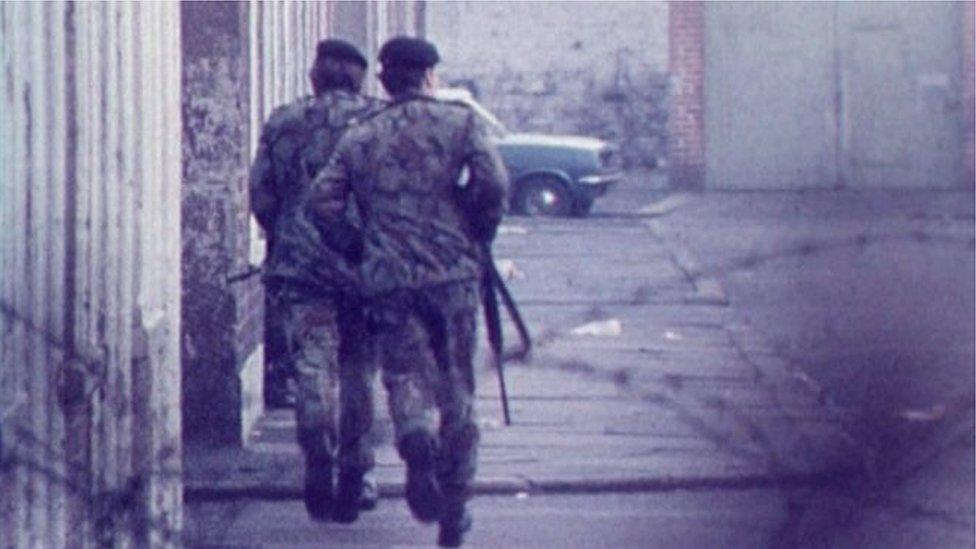Extend legal protections to Northern Ireland veterans, say MPs
- Published

Legislation giving soldiers stronger legal protection against prosecution for alleged offences committed abroad should be widened to include Northern Ireland veterans, MPs have said.
In a Commons debate on whether to give immunity to NI veterans, Tory MP Damien Moore said ministers had failed in their "sacred duty" towards them.
Veterans were "living in fear" over endless investigations, he suggested.
Ministers are consulting on how to deal with "legacy" cases fairly.
Some victims' groups and politicians in Northern Ireland believe that no-one should be above the law.
Six former soldiers are currently facing prosecution over Troubles-era killings, although not all the charges are murder.
They include Soldier F, who is facing murder charges over the killing of two people - James Wray and William McKinney - on Bloody Sunday in Londonderry in 1972.
There has been increasing political controversy over the extent to which soldiers accused of crimes in the line of duty in Northern Ireland should be investigated.
A petition calling for the authorities not to "prosecute the military for its work in Northern Ireland" is being debated in Parliament after it obtained more than 146,000 signatures.
'Living in fear'
Opening the debate, Mr Moore said the signatories wanted concrete action, including a commitment by the authorities not to re-open investigations where soldiers had been cleared, or to proceed with prosecutions once a certain amount of time had elapsed.
"It is this government's duty to care for and look after our precious veterans who stood on the front lines to protect us from some of the bloodiest enemies our nation has encountered," he said.
"We cannot let former brave personnel spend the rest of their lives in fear of yet more investigations, trials and prosecutions."
The government announced last week that soldiers and veterans would be given stronger legal protections against prosecution for alleged crimes committed in combat operations abroad.
This is likely to include a presumption against criminal proceedings into incidents that took place more than 10 years ago - including in Iraq and Afghanistan.
It was reported on Sunday that No 10 had vetoed similar provisions for Northern Ireland.
Defence Secretary Penny Mordaunt said service personnel should not be "victims of unfounded allegations"
Mr Moore said this was unacceptable and legislation should include all those who had served in Northern Ireland under Operation Banner from the late 1960s through to the 2000s.
He said his message to the government was "enough with the hesitation, enough with the special provisions that in the name of supposed human rights violations have caused our country to be derelict in that sacred duty of care".
"Whether it be in the name of political correctness, our out of fear of opening old wounds, it is now our duty to put an end to any wavering and decisively take proactive action on behalf of those who put their lives on line out of a sense of duty and love of country."
'Within the law'
Labour's Luke Pollard said members of the armed forces had been "betrayed" by the government, while his colleague Ruth Smeeth said she knew of veterans in their 70s who had received paperwork from the Ministry of Defence but were "too scared to open it".
"They are worried about what this means and what happens afterwards. It is about people who put their lives on the line but don't feel they have the support from government."
Speaking on Sunday, defence minister Tobias Ellwood said legacy cases had not been handled in the best way but the government had to act within the law.
He said any amnesty for soldiers from prosecution would have to be extended to paramilitaries currently under investigation as well.
In its formal response to the petition last month, the Northern Ireland Office said no-one could be immune from prosecution, however long ago the alleged offences took place.
"Where there is evidence of wrongdoing it is right that this should be investigated and, where the evidence exists, for prosecutions to follow," it said.